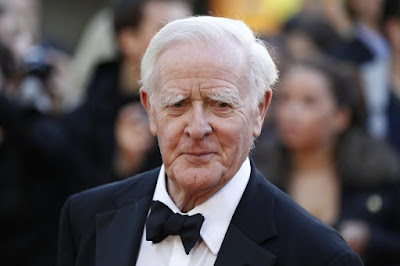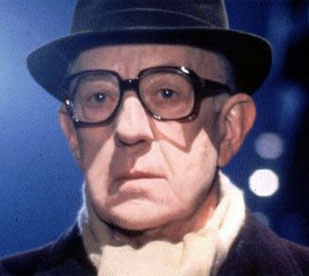 |
| David Cornwell aka John Le Carre |
John Le Carre has had a lot of literary attention in recent
times. Following a voluminous biography by Adam Sisman,
which apparently Le Carre is not entirely happy about, there is the master’s
own version of some elements of his life The Pigeon
Tunnel.
Time then for some reflection about le Carre on screen.
Several contributions are in train, the first of which is by major Le Carre
enthusiast Rod Bishop who writes.
I find it hard to separate Martin Ritt’s The Spy Who Came In from The Cold (1965) from the BBC series Tinker, Tailor, Soldier, Spy (1979), directed by John Irvin.
 |
| Richard Burton as Leamas in The Spy Who Came in from the Cold |
The BBC series of Tinker, Tailor, Soldier, Spy is similarly authoritative. From the opening scene with Bill Hayden (Ian Richardson) juggling his cup and saucer to Percy Alleline’s “Now let us begin”; to the all night grilling of informant Ricki Tarr: “I’ve got a story to tell you. It’s all about spies. And if it’s true, which I think it is, you boys are going to need a whole new organization”; to Sir Oliver Lacon opening the curtains after listening to Tarr and turning to Smiley (Alec Guinness): “Fit George?...Natter?...Garden?” to which Smiley manages “Super” under his breath as a retort; to the fallen agent Jim Prideaux masquerading as a rural school teacher and protecting an over-weight school boy he calls Jumbo; to the many raised eyebrows Smiley must endure when repeatedly asked “How’s the lovely Ann?” – it’s nigh on faultless.
 |
| Alec Guiness as Smiley in two BBC adaptations |
Among the many qualities in the sequel Smiley’s People (1982) is Michael Lonsdale’s hapless Anton Grigoriev and his sudden realization he’s been kidnapped by a bunch of former English schoolboys, now real spies. Smiley’s People also boasts a resonant and masterful conclusion to a narrative clue (a cigarette lighter) first planted eight hours previously in the predecessor series Tinker, Tailor, Soldier, Spy. Along with A Perfect Spy (1987), the BBC’s adaptation of Le Carre’s homage to his early spy craft and his rouge father, these three series are not given nearly enough credit as laying the blueprint for the extended television series we know so well today.
Fernando Meirelles is responsible for the most visually imaginative of all le Carre adaptations, The Constant Gardener (2005) and perhaps the only version of the author’s works that is better than the book. The recent television series The Night Manager (2016) was engaging, but sacrificed narrative depth for eye-candy slickness.
Overall, the failed Le Carre adaptations
greatly outweigh the successes. There are just too many plodding films – The Tailor of Panama (2001), The Russia House (1990), Our Kind of Traitor (2016), The Deadly Affair (1966), The Little Drummer Girl (1984), The Looking Glass War (1969) and A Most Wanted Man (2014). And, of course, the one disastrous
travesty - Tinker, Tailor, Soldier, Spy (2011) with
Gary Oldman (!) as George Smiley. What were they thinking?
No comments:
Post a Comment
Note: only a member of this blog may post a comment.